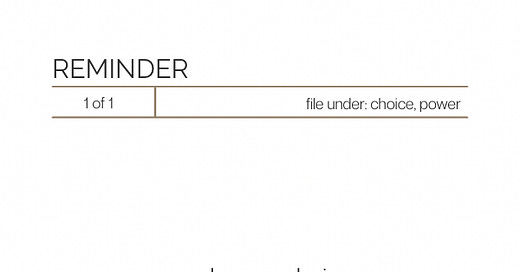I created the image you see above last Sunday, May 1. After a very full birthday weekend, I was sitting down to write this newsletter and realized I didn’t want to. I didn’t want to spend my last weekend hours typing onto a screen. I wanted to go back outside with my family into the glorious spring sunshine.
So that’s what I did. I typed these four words, shut my laptop and went on with my life.
The next evening, a draft Supreme Court decision overturning Roe v. Wade was leaked, and suddenly (but not suddenly at all) our fundamental human right to choose how we live our lives was in imminent danger.
So yeah… choice. The newsletter I didn’t write last week might have gone something like: We all have a choice, every moment. We choose to say something or to say nothing. We choose to do nothing, or we choose to do something. We choose to stay inside or go outside. We choose to leave our jobs or to stay. We choose to retreat, or we choose to rally.
Too often, I think, we believe we have no choice. I might have felt bound by my publishing schedule to keep working last Sunday. You might feel you can’t leave your job because what if you can’t find a new one. But it is almost always true that we have more choice than we think we do.
As the aphorism goes, we may not be able to choose much of what happens to us, but we can choose how we respond.
Few choices are empirically right or wrong. Each has consequences, which we can weigh—to the extent we can anticipate them. We might make one choice in one season of our lives and a different choice under different circumstances. We usually do. And when a choice we make doesn’t work out the way we hoped? Fear not, you’ll get to make another choice soon enough.
Last week, I might have stopped there. But it’s worth remembering that what we do with our choice is less important than our ability, our right, our freedom to choose in the first place.
When choice is withheld, we experience it as a violation. A trauma. But context matters. Intent and outcome matter. Some people who felt violated by vaccination or mask mandates in the name of public health have no issue restricting other people’s choices, especially when it comes to women’s healthcare. These people claim to be “pro-life.”
But the opposite of choice is not life. It is domination, the state of being controlled.
Domination is inherently dehumanizing. Choice respects humanity, and enables life.
In the comments: Let’s explore this notion that choice enables life? Where do you find this to be true? Where is it not quite right?
This came into focus for me when I was training in trauma-informed mindfulness. Any trauma-informed approach (whether to healthcare, therapy, teaching, facilitation, etc.) includes the core principle of choice for the participant(s)—the power to choose how they engage with what is offered. For example, choosing the topic of a therapy session or choosing to be on-/off-camera in a virtual setting.
Anything forced upon us has the potential to re-traumatize us, shut us down, spark our defense mechanisms. But when we can choose the path our learning and/or healing will take, we experience a fundamental sense of safety and agency, as well as responsibility.
We can do what needs to be done.
We can own our choices.
We can go on with our lives.
My friends, may we remember that the forces of domination depend on their targets feeling hopeless, being helpless, believing themselves to be without choice.
May we remember that choice is our birthright. It is our liberation. No one can take it from us. And if we choose to show up powerfully together, no one will.
This week
Consider a difficult situation in your life or in your leadership.
What is the choice you have to make?
Try rewording it: What is the choice you get to make? (Does that shift anything for you?)
Where do you have more choice than you might initially believe you have?
Where is a person/policy/institution limiting choice? What is the context, intent and outcome? Is it necessary?
Where can you give the other person(s) involved more choice?





Thank you for another thoughtful and thought provoking start to the week. I had a moment this weekend where I believed I had no choice. If I didn’t forge ahead, everyone around me would be disappointed, unhappy, stressed. So I did the thing and fought it the whole way, making myself and others miserable. And in retrospect, I realize, that was still my choice. To be anxious and miserable, but a choice nonetheless. So, if I had seen the moment for what it was - a decision point - there are so many better choices I could have made. A STOP or a mindful moment would have helped immensely. I might have seen that the only control I had was to make a different choice.